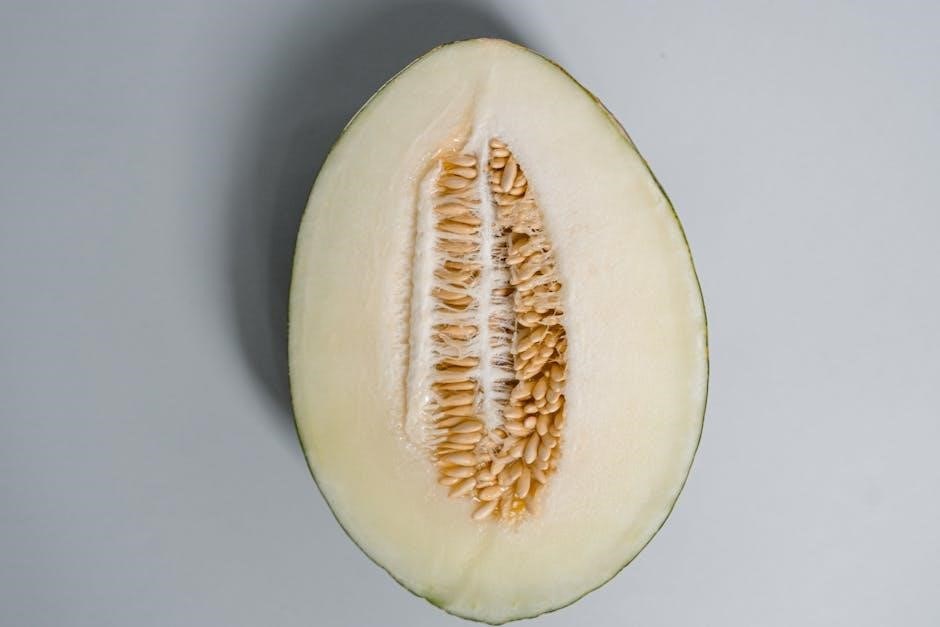Unlock your full potential with a well-structured half marathon diet plan. Discover expert nutrition tips, strategies, and meal plans to optimize energy, endurance, and recovery for peak performance.
Why a Diet Plan is Crucial for a Half Marathon
A well-structured diet plan is essential for half marathon success, ensuring optimal energy levels, endurance, and recovery. Proper nutrition helps prevent common issues like cramps, fatigue, and gastrointestinal discomfort during the race. It supports muscle repair, immune function, and mental clarity, all critical for peak performance. A tailored diet plan also addresses individual runner needs, balancing macronutrients and hydration strategies. Without a solid plan, runners risk underperforming or facing health setbacks. A strategic approach to nutrition ensures the body is fueled for training, race day, and recovery, making it a cornerstone of achieving your half marathon goals effectively and safely.
Overview of Key Nutrients and Their Importance
A balanced diet for half marathon training revolves around key nutrients that fuel performance, aid recovery, and maintain overall health. Carbohydrates are the primary energy source, providing glycogen for sustained effort. Protein is vital for muscle repair and growth, while healthy fats support hormone production and energy metabolism. Electrolytes, such as sodium and potassium, are crucial for hydration and preventing cramps. Hydration itself is essential for bodily functions and performance. Together, these nutrients create a foundation that supports endurance, reduces injury risk, and enhances recovery, ensuring runners can train consistently and perform at their best on race day.

Key Nutrients for a Half Marathon Diet
Carbohydrates, protein, and healthy fats are essential for energy, muscle repair, and sustained performance. Electrolytes maintain fluid balance, preventing cramps and fatigue during your race.
Carbohydrates: The Primary Energy Source
Carbohydrates are the body’s primary energy source during intense activities like running. They are stored as glycogen in muscles and liver, providing quick energy. For a half marathon, focus on complex carbs such as whole grains, fruits, and vegetables, which digest slowly and maintain energy levels. Simple carbs, like sports drinks or gels, are ideal during the race for rapid energy replenishment. Aim to consume 1.5-3 grams of carbs per kilogram of body weight 1-3 hours before running. Proper carb intake ensures sustained endurance and delays fatigue, making them a cornerstone of your half marathon diet plan.
Protein: Essential for Muscle Repair and Recovery
Protein is vital for muscle repair and recovery, especially during half marathon training. Runners require 1.2-1.6 grams of protein per kilogram of body weight daily to rebuild and strengthen muscles. Include high-quality sources like lean meats, fish, eggs, dairy, and plant-based options such as legumes and tofu. Protein helps reduce muscle soreness and supports overall performance. Aim to distribute protein intake evenly throughout the day, with a post-run recovery meal or shake containing 20-30 grams of protein within 30-60 minutes after training. This promotes faster recovery and prepares your body for the next workout.
Fats: The Role of Healthy Fats in Sustained Energy

Healthy fats are essential for sustained energy during long runs. They provide a dense energy source, delaying fatigue and supporting endurance. Incorporate sources like avocados, nuts, seeds, and olive oil into your diet. Fats also aid in vitamin absorption and hormone production. Balance fat intake with carbohydrates and protein to avoid digestive discomfort during training. Aim for 20-30% of daily calories from healthy fats to maintain energy levels and support overall performance. Portion control is key to avoid overconsumption, ensuring optimal energy balance for your half marathon training.
Electrolytes and Hydration: Maintaining Proper Fluid Balance
Hydration and electrolyte balance are critical for half marathon performance. Electrolytes like sodium, potassium, and calcium regulate fluid balance, nerve function, and muscle contractions. Depletion can lead to cramps, fatigue, and dizziness. Aim to drink 8-10 glasses of water daily, increasing intake during intense training. Incorporate electrolyte-rich foods or sports drinks, especially during and after long runs. Practice hydration strategies during training to avoid stomach discomfort. Monitor urine color for proper hydration—pale yellow indicates optimal levels. Balancing fluids and electrolytes ensures sustained energy and prevents dehydration, keeping you performing at your best throughout the race.

Structuring Your Diet Plan
A well-organized diet plan is essential for optimizing energy levels and supporting half marathon training. Focus on balanced meals, proper timing, and nutrient-dense foods to fuel performance and recovery.
Pre-Run Nutrition: Fueling Your Body Before Training
Fueling your body before a run is crucial for optimal performance. Aim to eat a balanced meal 2-3 hours before training, focusing on complex carbohydrates, lean proteins, and healthy fats. Include foods like oatmeal, whole-grain toast, or fruits to provide sustained energy. Avoid heavy, high-fiber, or fatty foods that may cause digestive discomfort. Hydrate adequately with water or electrolyte-rich drinks to maintain fluid balance. Experiment with different foods during training to find what works best for your body. A well-planned pre-run meal ensures you start your workout energized and ready to tackle your goals effectively.
Nutrition During the Race: Strategies for Optimal Energy
During the race, maintaining consistent energy levels is key. Consume easily digestible carbohydrates, such as energy gels or bananas, every 20-30 minutes to replenish glycogen stores. Aim for 30-60 grams of carbs per hour, depending on your pace and duration. Stay hydrated by drinking water or electrolyte-rich beverages to prevent dehydration and maintain proper bodily functions. Avoid heavy or high-fiber foods that may cause stomach discomfort. Practice your race-day nutrition strategy during training to ensure your body can tolerate the fuels you choose. Properly timed and balanced nutrition will help you maintain energy and cross the finish line strong.

Post-Run Recovery: Refueling for Muscle Repair
After completing your half marathon, refueling within 30-60 minutes is crucial for muscle repair and recovery. Consume a mix of protein and carbohydrates to replenish glycogen stores and repair muscle tissue. Aim for 20-30 grams of high-quality protein, such as lean meats, eggs, or plant-based alternatives, paired with complex carbs like whole grains or fruits. Incorporate electrolytes to rebalance fluids and prevent cramps. Stay hydrated with water or a recovery shake. Avoid heavy or greasy foods that may cause digestive discomfort. Prioritize whole, nutrient-dense foods over supplements for optimal recovery. Consistency in post-run nutrition will enhance your body’s ability to heal and adapt.

Sample Meal Plan for Half Marathon Training
A 12-week meal plan covering breakfast, lunch, dinner, and snacks, with high-carb snacks for energy, emphasizing whole, minimally processed foods for optimal performance.
12-Week Meal Plan Overview
This structured 12-week meal plan is designed to optimize energy levels, support recovery, and enhance performance during half marathon training. It includes balanced breakfast, lunch, dinner, and snack options, with a focus on high-carb snacks for quick energy boosts. The plan emphasizes whole, minimally processed foods to ensure proper nutrition. Each week builds progressively, aligning with training intensity. Hydration and electrolyte intake are also highlighted to maintain fluid balance. The plan avoids processed foods and high-sugar options, promoting a clean diet that fuels the body efficiently. It also includes tips for pre-run fueling and post-run recovery to maximize training benefits.
Sample Weekly Meal Plan: Breakfast, Lunch, Dinner, and Snacks
A typical week includes balanced meals like oatmeal with fruit for breakfast, grilled chicken salads for lunch, and quinoa with lean proteins for dinner. Snacks such as bananas, nuts, or energy bars are recommended for quick energy boosts. Hydration is emphasized with water and electrolyte-rich drinks. Meals are tailored to provide sustained energy, with complex carbs, lean proteins, and healthy fats. High-carb snacks like whole-grain toast or fruits are suggested before runs. The plan avoids processed foods, focusing on whole, nutrient-dense options to support training and recovery. Adjustments can be made based on individual calorie needs and training intensity.
High-Carb Snacks for Energy Boost
High-carb snacks are essential for quick energy during training. Opt for bananas, energy gels, or whole-grain toast with honey. These snacks provide rapid glucose absorption, delaying fatigue. Energy bars with a mix of carbs and protein are also ideal. Fresh or dried fruits, such as dates or raisins, offer natural sugars for an instant boost. Incorporate these snacks 30 minutes to 1 hour before runs to maximize energy levels. Avoid high-fiber options to prevent digestive discomfort. These snacks are designed to fuel your workouts and support endurance, ensuring you perform at your best during long runs and races.

Hydration and Electrolytes
Proper hydration and electrolyte balance are vital for peak performance. Electrolytes like sodium and potassium maintain fluid balance, preventing cramps and fatigue during races. Stay hydrated consistently.
The Importance of Proper Hydration
Proper hydration is essential for maintaining optimal performance during a half marathon. Even mild dehydration can lead to fatigue, dizziness, and decreased endurance. Electrolytes, such as sodium and potassium, play a crucial role in regulating fluid balance and nerve function. Runners should drink electrolyte-rich beverages before, during, and after training to replenish lost salts and prevent cramps. Aim to consume fluids regularly, rather than waiting until dehydration symptoms appear. Monitoring urine color and frequency can help gauge hydration levels. Staying hydrated ensures your body functions efficiently, delaying fatigue and enhancing overall race performance.
Electrolyte Balance: Preventing Cramps and Fatigue
Maintaining proper electrolyte balance is vital for preventing cramps and fatigue during a half marathon. Electrolytes, such as sodium, potassium, and magnesium, regulate nerve and muscle function, which is critical for sustained performance. Excessive sweating during long runs depletes these essential minerals, leading to muscle cramps and energy drops. To prevent this, incorporate electrolyte-rich foods like bananas, nuts, and avocados into your diet. Additionally, consume electrolyte-enhanced beverages or tablets during training and races to replenish lost salts; Proper electrolyte balance ensures smooth muscle function, delays fatigue, and supports overall athletic performance, keeping you strong throughout the 13.1 miles;

Practicing Your Nutrition Plan
Consistently test your race-day nutrition strategy during training to ensure your body adapts and performs optimally, avoiding new foods or practices on race day for best results.
Testing Your Race Day Nutrition Strategy
Testing your race-day nutrition strategy is crucial to ensure it works flawlessly during the event. Start by simulating race conditions during long training runs. Consume the same pre-run meal, mid-run fuels, and hydration as planned for race day. Pay attention to how your body reacts, noting any digestive discomfort or energy fluctuations. Adjust portions, timing, or food choices based on feedback. For example, if a specific gel causes stomach issues, experiment with alternatives. Document what works best and refine your plan accordingly. Consistent testing builds confidence and prevents surprises on race day, ensuring optimal performance and comfort throughout the 13.1 miles.
Adjusting Your Plan Based on Training Feedback
As you progress in your half marathon training, it’s essential to adjust your nutrition plan based on feedback from your body and performance. Pay attention to how different meals and hydration strategies affect your energy levels, digestion, and recovery. For instance, if you experience stomach discomfort after certain foods, consider alternatives that are easier to digest. Similarly, if you notice consistent fatigue, you may need to increase your carbohydrate intake or adjust your hydration and electrolyte balance. Keep a food diary to track what works and what doesn’t, allowing you to refine your diet for optimal performance. Adjustments should be gradual to avoid overwhelming your system, ensuring you feel your best on race day.

Common Mistakes to Avoid
- Never experiment with new foods or hydration strategies on race day.
- Avoid overloading on high-fiber foods before runs to prevent digestive discomfort.

Not Trying New Foods on Race Day
One of the most critical mistakes runners make is experimenting with new foods or hydration strategies on race day. Stick to familiar, tested options to avoid digestive discomfort or energy crashes. New foods can cause unexpected reactions, such as bloating, cramps, or diarrhea, which can derail your performance. Instead, practice your nutrition plan during training to ensure your body adapts to the foods and hydration methods you’ll use on race day. Consistency and familiarity are key to optimizing energy levels and maintaining peak performance. Always test new strategies during training, never on the day of the event.
Overloading on Fiber Before a Run
Consuming excessive fiber before a run can lead to digestive discomfort, such as bloating, cramps, and diarrhea, which can hinder performance. While fiber is essential for overall health, it’s best to limit high-fiber foods in the 24-48 hours leading up to a race or long training session. Opt for low-fiber, easily digestible meals and snacks to minimize stomach issues. Focus on balanced, nutrient-rich foods that provide sustained energy without causing gastrointestinal distress. Avoid sudden changes in your diet to ensure your body remains comfortable and fueled throughout your run. Proper digestion is key to maintaining energy and endurance during a half marathon.
A well-planned half marathon diet ensures peak performance and recovery. Consistency in nutrition and hydration strategies will help you cross the finish line strong and feeling accomplished.
Final Tips for a Successful Half Marathon Diet
Consistency is key to a successful half marathon diet. Stick to your nutrition plan and avoid experimenting on race day. Opt for high-quality, minimally processed foods to fuel your body. Practice your race-day nutrition during long training runs to ensure your stomach can handle it. Stay hydrated by consuming fluids with electrolytes to maintain proper fluid balance. Recovery is crucial, so prioritize post-run meals rich in carbohydrates and protein within 30 minutes of finishing. Finally, listen to your body and adjust your diet based on how you feel during training. A well-executed diet plan will boost your performance and overall race experience.
The Importance of Consistency and Planning
Consistency and planning are fundamental to achieving your half marathon goals; A well-structured diet plan ensures your body is properly fueled for training and recovery. Avoid last-minute changes and stick to tried-and-tested nutrition strategies. Plan meals in advance to avoid relying on processed foods, and practice your race-day nutrition during long runs. Consistency in hydration and electrolyte intake is equally crucial to prevent cramps and fatigue. By maintaining a disciplined approach, you’ll optimize energy levels, enhance performance, and reduce the risk of nutrition-related issues on race day. A consistent and well-planned diet lays the foundation for a successful half marathon experience.
